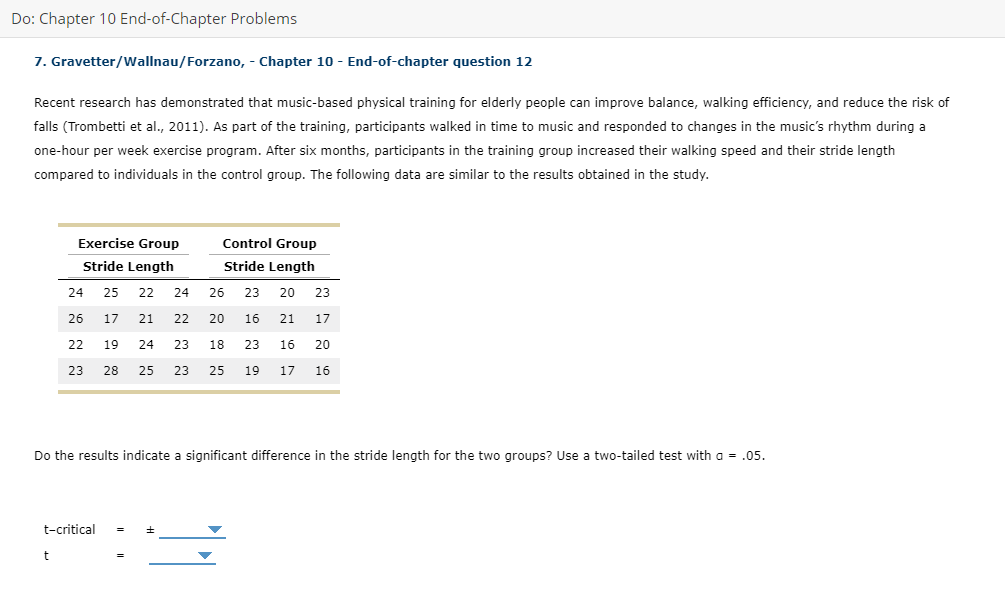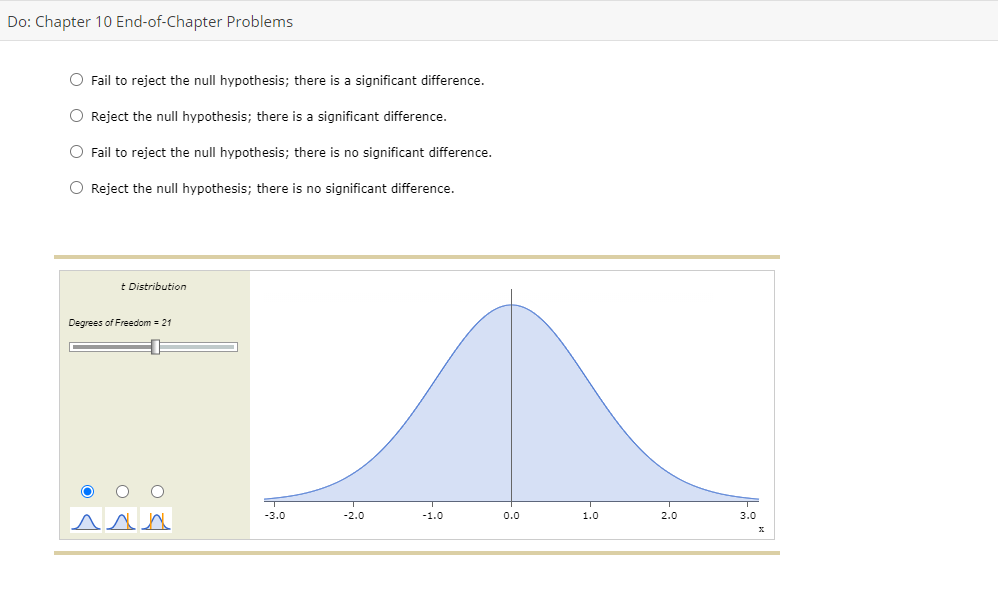7. Gravetter/Wallnau/Forzano, - Chapter 10 - End-of-chapter question 12 Recent research has demonstrated that music-based physical training for elderly people can improve balance, walking efficiency, and reduce the risk falls (Trombetti et al., 2011). As part of the training, participants walked in time to music and responded to changes in the music's rhythm during a one-hour per week exercise program. After six months, participants in the training group increased their walking speed and their stride length compared to individuals in the control group. The following data are similar to the results obtained in the study. Exercise Group Control Group Stride Length Stride Length 24 25 22 24 26 23 20 23 26 17 21 22 20 16 21 17 22 19 24 23 18 23 16 20 23 28 25 23 25 19 17 16 Do the results indicate a significant difference in the stride length for the two groups? Use a two-tailed test with a = .05. t-critical
7. Gravetter/Wallnau/Forzano, - Chapter 10 - End-of-chapter question 12 Recent research has demonstrated that music-based physical training for elderly people can improve balance, walking efficiency, and reduce the risk falls (Trombetti et al., 2011). As part of the training, participants walked in time to music and responded to changes in the music's rhythm during a one-hour per week exercise program. After six months, participants in the training group increased their walking speed and their stride length compared to individuals in the control group. The following data are similar to the results obtained in the study. Exercise Group Control Group Stride Length Stride Length 24 25 22 24 26 23 20 23 26 17 21 22 20 16 21 17 22 19 24 23 18 23 16 20 23 28 25 23 25 19 17 16 Do the results indicate a significant difference in the stride length for the two groups? Use a two-tailed test with a = .05. t-critical
MATLAB: An Introduction with Applications
6th Edition
ISBN:9781119256830
Author:Amos Gilat
Publisher:Amos Gilat
Chapter1: Starting With Matlab
Section: Chapter Questions
Problem 1P
Related questions
Question

Transcribed Image Text:Do: Chapter 10 End-of-Chapter Problems
7. Gravetter/Wallnau/Forzano, - Chapter 10 - End-of-chapter question 12
Recent research has demonstrated that music-based physical training for elderly people can improve balance, walking efficiency, and reduce the risk of
falls (Trombetti et al., 2011). As part of the training, participants walked in time to music and responded to changes in the music's rhythm during a
one-hour per week exercise program. After six months, participants in the training group increased their walking speed and their stride length
compared to individuals in the control group. The following data are similar to the results obtained in the study.
Exercise Group
Control Group
Stride Length
Stride Length
24 25
22
24
26
23
20
23
26
17
21
22
20
16
21
17
22
19
24
23
18
23
16
20
23
28
25
23
25
19
17
16
Do the results indicate a significant difference in the stride length for the two groups? Use a two-tailed test with a = .05.
t-critical

Transcribed Image Text:Do: Chapter 10 End-of-Chapter Problems
O Fail to reject the null hypothesis; there is a significant difference.
O Reject the null hypothesis; there is a significant difference.
O Fail to reject the null hypothesis; there is no significant difference.
O Reject the null hypothesis; there is no significant difference.
t Distribution
Degrees of Freedom = 21
-3.0
-2.0
-1.0
0.0
1.0
2.0
3.0
AAN
Expert Solution
This question has been solved!
Explore an expertly crafted, step-by-step solution for a thorough understanding of key concepts.
This is a popular solution!
Trending now
This is a popular solution!
Step by step
Solved in 2 steps with 3 images

Recommended textbooks for you

MATLAB: An Introduction with Applications
Statistics
ISBN:
9781119256830
Author:
Amos Gilat
Publisher:
John Wiley & Sons Inc

Probability and Statistics for Engineering and th…
Statistics
ISBN:
9781305251809
Author:
Jay L. Devore
Publisher:
Cengage Learning

Statistics for The Behavioral Sciences (MindTap C…
Statistics
ISBN:
9781305504912
Author:
Frederick J Gravetter, Larry B. Wallnau
Publisher:
Cengage Learning

MATLAB: An Introduction with Applications
Statistics
ISBN:
9781119256830
Author:
Amos Gilat
Publisher:
John Wiley & Sons Inc

Probability and Statistics for Engineering and th…
Statistics
ISBN:
9781305251809
Author:
Jay L. Devore
Publisher:
Cengage Learning

Statistics for The Behavioral Sciences (MindTap C…
Statistics
ISBN:
9781305504912
Author:
Frederick J Gravetter, Larry B. Wallnau
Publisher:
Cengage Learning

Elementary Statistics: Picturing the World (7th E…
Statistics
ISBN:
9780134683416
Author:
Ron Larson, Betsy Farber
Publisher:
PEARSON

The Basic Practice of Statistics
Statistics
ISBN:
9781319042578
Author:
David S. Moore, William I. Notz, Michael A. Fligner
Publisher:
W. H. Freeman

Introduction to the Practice of Statistics
Statistics
ISBN:
9781319013387
Author:
David S. Moore, George P. McCabe, Bruce A. Craig
Publisher:
W. H. Freeman